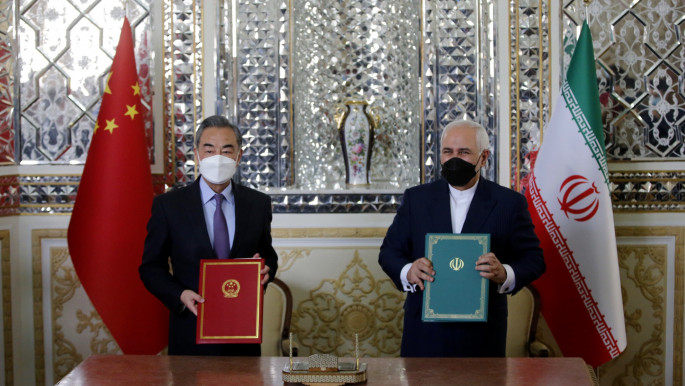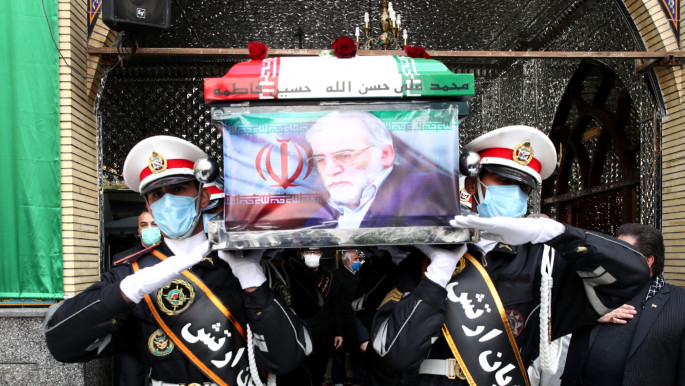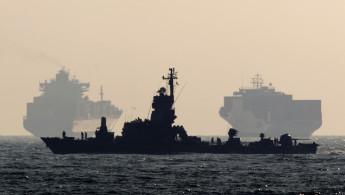How Israel and Iran's shadow war is playing out at sea
The latest developments come as the US and Iran's return to the Joint Comprehensive Plan of Action (JCPOA) becomes increasingly conceivable.
Several high-profile incidents occurred in 2020. In the summer, explosions took place at Iranian military and nuclear facilities, notably at the underground Natanz facility. Iran declared the incident an act of "sabotage", with suspicions falling on Israel.
Then, in November, the head of the Iranian nuclear program, Mohsen Fakhrizadeh, was assassinated. Though unproven, the tactics used strongly suggested that it was an operation by Israel's Mossad's intelligence agency.
The incident continued a long history of strikes against Iran's nuclear program, with at least four Iranian nuclear scientists assassinated between 2010 and 2012, including some of Fakhrizadeh's deputies.
These patterns have also made Israel the prime suspect in the latest attack on the Natanz nuclear power plant on 11 April. The Iranian leadership confirmed the incident a day later and blamed Tel Aviv.
 |
Iranian soil is not the only place where the shadow war is being fought. Since 2019, incidents are also taking place at sea, particularly in the Suez Canal, the Strait of Hormuz and the Arabian Peninsula |  |
The attack caused significant damage to the facilities and could reportedly delay Iran's uranium enrichment for nine months. Iran's Foreign Minister Mohammad Javad Zarif called the attack "nuclear terrorism" and pledged revenge. Shortly after the attack, Iran began enriching uranium to 60 per cent purity.
However, Iranian soil is not the only place where the shadow war is being fought. Other battlefields such as Lebanon, Syria and cyberspace play a significant role as well. Since 2019, incidents are also taking place at sea, particularly in the Suez Canal, the Strait of Hormuz and the Arabian Peninsula.
 |
|
| Read more: How America's 'maximum pressure' on Iran made China a winner |
Both sides have conducted attacks and counter attacks in a pattern where Israel has been accused of damaging Iranian ships and Tehran is suspected of responding with attacks on Israeli freighters.
As part of this campaign, Israel is suspected of having conducted a mine attack in mid-April on the Saviz Iranian cargo ship in the Red Sea. According to Iranian media, the ship's primary purpose was to escort Iranian merchant ships in the Red Sea.
However, reports also claimed the Saviz serves the Iranian Revolutionary Guard for espionage purposes as well as a maritime base to support the Houthi rebels in Yemen. Israel is said to have informed Washington shortly beforehand about the attack, which is not without implications.
Israel did not comment on the incident. However, a few days after the attack, Defence Minister Benny Gantz reiterated his country's proclivity for pre-emptive action. "We have offensive systems operating 24/7, 365 days a year, and they are ready to go into action in any arena and over any distance."
Although the conflict at sea has escalated since an Iranian oil tanker was attacked in October 2019, it has remained less in the focus of public debate compared to Israel's operations against Iranian forces in Syria. Since then, Israel has reportedly attacked more than a dozen Iranian ships, at the cost of billions of dollars to Tehran.
 |
Israel has reportedly attacked more than a dozen Iranian ships, at the cost of billions of dollars to Tehran |  |
For example, an Iranian tanker was damaged by mines off the Syrian coast in February. In March, a fire broke out on the Shahr e Kord, also off the Syrian coast, when an explosive object hit the ship.
Israeli vessels have also been targeted. In February, the MV Helios Ray was damaged by an explosion in the Gulf of Oman. On 25 March, the cargo ship Lori was attacked in the Arabian Sea, travelling from India to Tanzania. According to the official reports, none of the ships were sunk in the process, nor were crew members harmed.
While Israel has yet to acknowledge its role in the conflict publicly, its motivations are clear.
For one, Israel is trying to prevent Iran from arming Hezbollah in neighbouring Lebanon. Ships that are suspected of delivering arms are hence a primary target. Moreover, by targeting Iranian oil tankers, Israel is trying to prevent Iran from circumventing international sanctions to sell oil and using the proceeds for military operations.
 |
|
| Read more: Fakhrizadeh's assassination: A new diplomatic obstacle for Biden's Iran policy |
However, another dynamic plays a crucial role in the conflict. Israel's attacks serve as a message to Washington and undermine US efforts to reenter the JCPOA. Despite Iran's assertions that its nuclear programme is peaceful, Israel is convinced that Tehran is working towards developing a nuclear warhead which could threaten Tel Aviv in the long run.
Israel has repeatedly said it would not be bound by any deal struck between Europe, the US, and Iran and will continue to consider necessary steps to ensure the country's security, even if it means sabotaging negotiations.
The most recent attack on Natanz is a testament to this. Not only did it occur one day after Iran's National Nuclear Technology Day, an annual celebration of Iran's nuclear advances introduced in 2006, but also a few days before American and Iranian negotiators met in Vienna for the first talks regarding a JCPOA return since Joe Biden took office.
 |
Israel has repeatedly said it would not be bound by any nuclear deal struck between Europe, the US, and Iran and will continue to consider necessary steps to ensure the country's security |  |
With the mediation of European contractual partners Germany, France and Great Britain, two working groups will now facilitate a coordinated procedure towards progress. However, resistance towards a deal is not only high in Israel but also in Washington and Iran.
Iran's hardliners have positioned themselves as opposed towards any attempts to return to a deal with the West. Furthermore, with elections looming, time is of the essence for President Hassan Rouhani to exit office with a landmark foreign policy success.
 |
|
| Read more: What a Biden presidency means for US ties with Israel |
Israel is aware that its attacks on Iranian facilities could force Iran to react in a way that could put negotiations in jeopardy. This is one reason why Iran has been somewhat silent on many previous incidents. Increased publicity, however, could force Tehran to retaliate and make an agreement even harder.
The question also arises as to whether the Biden administration was briefed about the attack in Natanz. If it was, Biden is pursuing a complicated strategy - a diplomatic tightrope act that could backfire rather swiftly.
If the US administration was not informed, it would be an indicator that Netanyahu is inclined to continue his tradition of snubbing Democratic presidents via unilateral actions counterproductive towards US interests, in this case, the JCPOA. If this is the case, the attack on the Saviz will not be the last of its kind.
Thomas O. Falk is a London-based freelance journalist who focuses on US affairs and the Middle East. He has written for Al Jazeera, Inside Arabia, il Giornale and other outlets.
Follow him on Twitter: @topfalk



